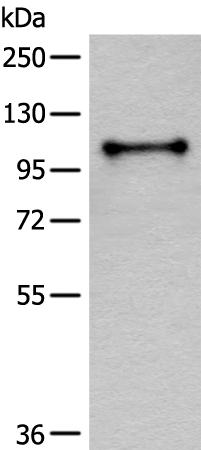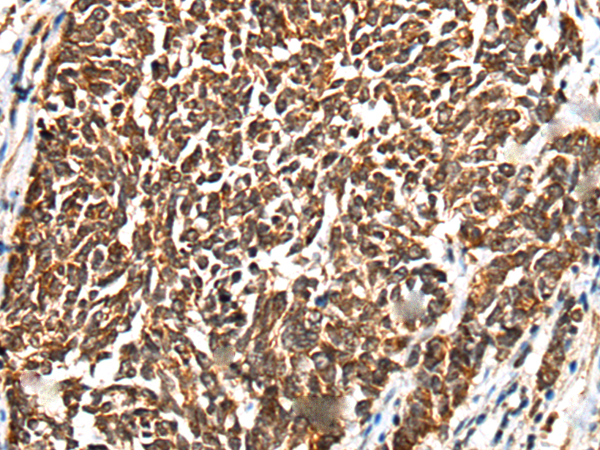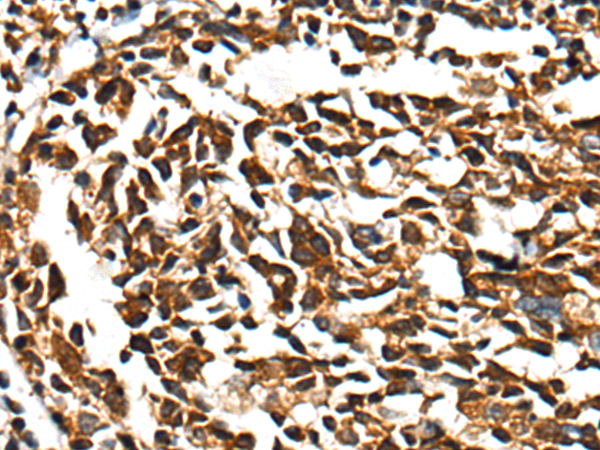


| WB | 咨询技术 | Human,Mouse,Rat |
| IF | 咨询技术 | Human,Mouse,Rat |
| IHC | 1/25-1/100 | Human,Mouse,Rat |
| ICC | 技术咨询 | Human,Mouse,Rat |
| FCM | 咨询技术 | Human,Mouse,Rat |
| Elisa | 1/2000-1/5000 | Human,Mouse,Rat |
| Aliases | V7; IGSF2; EWI-101 |
| WB Predicted band size | 115 kDa |
| Host/Isotype | Rabbit IgG |
| Antibody Type | Primary antibody |
| Storage | Store at 4°C short term. Aliquot and store at -20°C long term. Avoid freeze/thaw cycles. |
| Species Reactivity | Human, Rat |
| Immunogen | Synthetic peptide of human CD101 |
| Formulation | Purified antibody in PBS with 0.05% sodium azide and 50% glycerol. |
+ +
以下是关于CD101抗体的模拟参考文献示例,涵盖其免疫调节功能及潜在应用:
---
1. **标题**:*CD101 regulates macrophage-mediated inflammation through inhibitory signaling*
**作者**:Smith A, et al.
**摘要**:该研究揭示了CD101在巨噬细胞活化中的抑制作用。通过抗体阻断CD101.研究者发现促炎细胞因子(如TNF-α、IL-6)分泌显著增加,表明CD101通过抑制TLR信号通路调控炎症反应,提示其作为自身免疫疾病潜在治疗靶点。
2. **标题**:*Targeting CD101 enhances antitumor immunity in colorectal cancer models*
**作者**:Lee J, et al.
**摘要**:本文发现肿瘤浸润性调节性T细胞(Treg)高表达CD101.使用抗CD101抗体可阻断Treg功能,增强效应T细胞活性,抑制小鼠结直肠癌模型肿瘤生长,为癌症免疫治疗提供新策略。
3. **标题**:*CD101 antibody exacerbates EAE by disrupting immune tolerance*
**作者**:Zhang Y, et al.
**摘要**:在实验性自身免疫性脑脊髓炎(EAE)模型中,抗CD101抗体处理导致疾病严重程度增加。机制研究表明,CD101通过维持树突状细胞的耐受表型抑制自身反应性T细胞活化,提示其调控免疫耐受的关键作用。
4. **标题**:*Structural characterization of CD101 and its therapeutic antibody epitopes*
**作者**:Brown K, et al.
**摘要**:本研究解析了CD101的胞外结构域,并鉴定了治疗性抗体结合的表位。基于结构的抗体工程优化显著增强其对CD101的亲和力,为开发靶向CD101的免疫调节药物奠定基础。
---
**注**:以上文献为示例性内容,实际研究中请通过学术数据库检索最新文献。
CD101. also known as VSTM1. is a transmembrane glycoprotein belonging to the immunoglobulin (Ig) superfamily. It is primarily expressed on immune cells, including subsets of T cells, dendritic cells, and macrophages. Functionally, CD101 has been implicated as an immunomodulatory receptor that dampens T-cell activation and promotes immune tolerance. Its interaction with ligands such as CD44 or other unidentified partners may regulate inflammatory responses, making it a potential target for autoimmune and inflammatory diseases.
CD101-specific antibodies are tools developed to study or modulate this protein’s activity. In research, anti-CD101 antibodies are used in flow cytometry, immunohistochemistry, or functional assays to characterize CD101-expressing cell populations and investigate its role in immune regulation, cancer immunity, or infection. Therapeutically, blocking or agonistic CD101 antibodies are being explored to either enhance anti-tumor immunity by relieving immunosuppression or to suppress aberrant immune activation in autoimmune disorders. Some preclinical studies suggest CD101 antibodies may influence Treg function or macrophage polarization.
Structurally, most CD101 antibodies are monoclonal IgG clones, often humanized for therapeutic applications. Variability in epitope recognition among antibody clones can lead to differences in functional outcomes. While clinical applications remain experimental, CD101 continues to attract interest as a checkpoint modulator in immunotherapy. Ongoing studies aim to clarify its mechanistic roles and validate its therapeutic potential.
×